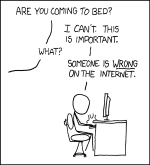Copernicus
Industrial Grade Linguist
Unter, I have no doubt that you would have seen the debate differently, given that you lack even a rudimentary understanding of the subject matter and its historical context.
I actually felt some sympathy for both sides, because Chomsky was talking about an "ideal speaker-hearer" in those days. However, he has always seen the subject matter of linguistics as fundamentally psychological in nature. IMO, he makes a fairly obvious mistake there, because language can be studied from two very different perspectives: a psychological system and a social system. When you talk about "language change" or "discourse theory", it is impossible to ignore the social perspective, but Chomsky tends to dismiss it as not very relevant to "real" linguistics, i.e. the psychological aspect of language that he is interested in. Katz focused on Chomsky's frequent use of the term "ideal", which pretty much allowed Chomsky to insert a backdoor reference to the social systemic nature of language without actually consciously admitting it.
So, on balance, I think that Jerry ought to have won his bet, but I have other differences with Chomsky on the nature of the so-called "Grammar". I think that he has an impossibly muddled concept of the separation between grammatical structure and behavioral strategies. He used to refer to the former as "linguistic competence" and the latter as "linguistic performance", but he pretty much stopped using those terms after so many of his colleagues poked holes in his distinction. Nowadays, he is a lot vaguer on the distinction, but he doesn't seem to have entertained the thought that this distinction was simply mistaken from the very beginning.
I actually felt some sympathy for both sides, because Chomsky was talking about an "ideal speaker-hearer" in those days. However, he has always seen the subject matter of linguistics as fundamentally psychological in nature. IMO, he makes a fairly obvious mistake there, because language can be studied from two very different perspectives: a psychological system and a social system. When you talk about "language change" or "discourse theory", it is impossible to ignore the social perspective, but Chomsky tends to dismiss it as not very relevant to "real" linguistics, i.e. the psychological aspect of language that he is interested in. Katz focused on Chomsky's frequent use of the term "ideal", which pretty much allowed Chomsky to insert a backdoor reference to the social systemic nature of language without actually consciously admitting it.
So, on balance, I think that Jerry ought to have won his bet, but I have other differences with Chomsky on the nature of the so-called "Grammar". I think that he has an impossibly muddled concept of the separation between grammatical structure and behavioral strategies. He used to refer to the former as "linguistic competence" and the latter as "linguistic performance", but he pretty much stopped using those terms after so many of his colleagues poked holes in his distinction. Nowadays, he is a lot vaguer on the distinction, but he doesn't seem to have entertained the thought that this distinction was simply mistaken from the very beginning.

